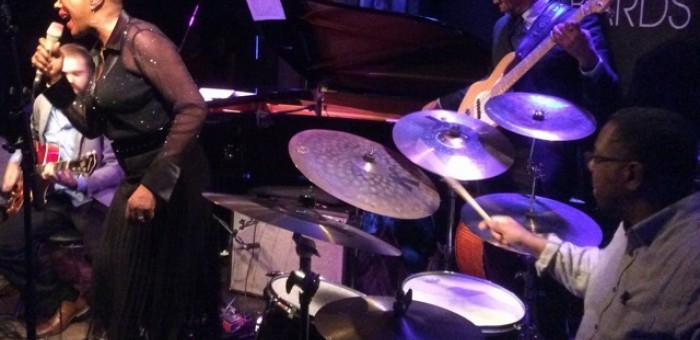Jan 13, 2026 2:09 PM
More Trump-Kennedy Center Cancellations
The fallout from the renaming of the John F. Kennedy Center for the Performing Arts to include President Donald…

Carmen Lundy (left), Darryl Hall and Marvin “Smitty” Smith perform at the Duc de Lombards in Paris.
(Photo: © Sarah Berrurier)The city of Paris was blessed with an abundance of great music in October and November. Jason Marsalis, who has relocated to Orléans, France, appeared on vibes at the Duc des Lombards. On the same night, the venue Sunside/Sunset presented elegant jazz pianist Enrico Pieranunzi and rough blues marvel Watermelon Slim.
One could also note the recent appearances of keyboardist/vocalist Ben Sidran (and his son Leo) at Sunside, trumpeter Marquis Hill at Duc and the ebullient New Jersey collective Spirit of Life Ensemble at the Caveau de la Huchette (a show for dancers only!).
But the greatest concerts of the bunch happened at the Duc des Lombards, where all of the following concerts took place.
On Oct. 25, pianist Spike Wilner (proprietor of the New York City venues Smalls and Mezzrow) and his quartet summoned the New York spirit and delivered two nights of swinging invention.
With the superb, crisp support of Tyler Mitchell on bass and Anthony Pinciotti on drums, the band explored ravishing tunes like “How Am I To Know?” and “Iceberg Slim,” groove numbers like “A Stitch In Time” and “Blues For The Common Man” and a slow blues based on “Parker’s Mood” that ratcheted into an obsessive 3/4 groove. Tenor saxophonist Joel Frahm was as strong as ever and delivered an unstoppable flow of ideas expressed with great poise and stamina.
Wilner’s music is based on atmospheres that keep changing, veering from poetry to swing, forcefulness to quietness. His pianism, his call-and-response phrases and overall invention are quite unique. His take on “Warm Valley” was intimate, displaying huge emotional involvement.
The same could be said of vocalist Carmen Lundy, who turned in four performances at Duc from Oct. 31–Nov. 1. Her forceful, funky lyricism is a clear departure from the excessive applications of cuteness and cliché that are so many singers’ pitfalls.
Lundy demonstrated her leadership skills, steering the music in whatever direction she wanted and gracefully guiding her young accompanists: Andrew Renfroe (guitar) and Victor Gould (piano). Renfroe added intelligent touches of color as a rhythm player and energy as a soloist. Gould was equally inspired, reaching soaring heights on “Afterglow.”
Both were fed huge doses of groove by Darryl Hall on electric and acoustic bass and Marvin “Smitty” Smith on drums. When those two lock into a groove, there’s no escaping its exhilarating power.
Lundy’s scatting is very personal, as is her delivery and tone, operatically soaring with great energy or whispering with a suggestion of repressed strength. The fervor was candidly intense on songs like “I Know Why The Caged Bird Sings,” “When Will They Learn” and “Come Home,” on which she managed to bring together softness, swing and aggressive beats with fluid musicality.
Pianist/vocalist Freddy Cole, 85, has always been a stickler for melody. He is also someone with in-depth knowledge of the standards. The bluesy gravel in his voice comes as a contrast to the sentimental material he explores with narrative sensibility.
On Nov. 4–5, unobtrusively supported by a fine quartet comprising the subtle Henry Conerway III on drums, Kris Kaiser on guitar and Barry Stephenson Jr. on bass, Cole delivered miniature phrases on piano that were reminiscent of Count Basie. His flawless interpretation of “A Lovely Way To Spend the Evening”, “Comme Ci, Comme Ca” (known in French as “Clopin-Clopant”) and “Easy Living” were touching. Closing with a funky blues, Cole used the raspiness in his voice to great effect.
Veteran pianist Steve Kuhn is full of zest and sprightly invention. With a massive amount of swing, he showed how the Bill Evans legacy could be developed and rejuvenated at Duc on Nov. 7–8.
One could feel the weight of maturity in the way Kuhn approached standards, even well-traveled tunes like “Blue Bossa,” a nod to trumpeter Kenny Dorham, who was among Kuhn’s first employers in 1959.
With his melodic developments and quirky rhythmic phrases, he let his lyrical playfulness and his drive shine, jumping from one idea to the next with great aplomb and precision.
“Emily” and “I Waited For You” were sensitive, as were his takes on “Slow Hot Wind” and his melodic rubato on “Trance/Oceans In The Sky.”
The support of bassist David Wong and drummer Billy Drummond was strong, each bringing a palpable presence without ever becoming overwhelming. The interaction between them really gelled into a textured unity.

Belá Fleck during an interview with Fredrika Whitfield on CNN.
Jan 13, 2026 2:09 PM
The fallout from the renaming of the John F. Kennedy Center for the Performing Arts to include President Donald…

Peplowski first came to prominence in legacy swing bands, including the final iteration of the Benny Goodman Orchestra, before beginning a solo career in the late 1980s.
Feb 3, 2026 12:10 AM
Ken Peplowski, a clarinetist and tenor saxophonist who straddled the worlds of traditional and modern jazz, died Feb. 2…

The success of Oregon’s first album, 1971’s Music Of Another Present Era, allowed Towner to establish a solo career.
Jan 19, 2026 5:02 PM
Ralph Towner, a guitarist and composer who blended multiple genres, including jazz — and throughout them all remained…

Rico’s Anti-Microbial Instrument Swab
Jan 19, 2026 2:48 PM
With this year’s NAMM Show right around the corner, we can look forward to plenty of new and innovative instruments…

Richie Beirach was particularly renowned for his approach to chromatic harmony, which he used to improvise reharmonizations of originals and standards.
Jan 27, 2026 11:19 AM
Richie Beirach, a pianist and composer who channeled a knowledge of modern classical music into his jazz practice,…